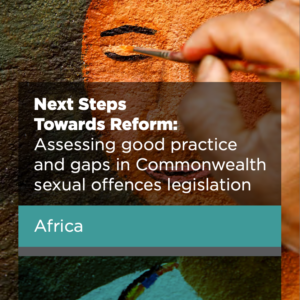Nigeria, a federation comprising 36 states, has multiple legislative frameworks for sexual offences. The Penal Code 1960 (PC) governs the 19 northern states. The Same-Sex Marriage Prohibition Act 2013 (SSMPA), a federal law that applies nationally, contains an offence that criminalises any public display ‘of same-sex amorous relationship directly or indirectly’. The Child Rights Act 2003 (CRA), which has been adopted by 23 ofNigeria’s 36 states, contains the single child sexual assault offence of ‘unlawful sexual intercourse with a child’. The Evidence Act 1990 contains the rules of evidence relevant for sexual offences in all parts of the country. Although individual states have the power to enact their own criminal law and some have done so, including the twelve states that practice sharia law, they are not included in this review.
Nigeria’s sexual offences laws do not meet many of the good practice indicators. Sexual offences in the PC are not gender-neutral. There are some specific child sexual assault offences in the CRA but they are not comprehensive. Nigeria does not provide close-in-age exceptions or defences in any legislation. Close-in-age defences are necessary to avoid criminalising young people and children who engage in consensual sexual activity with their peers. The age of consent to opposite-sex sexual activity is 16 under the PC.
The PC does not have an expansive definition of rape that includes all forms of non-consensual sexual penetration – by penis, objects and other body parts – of all orifices. Rape is limited in the PC to penile penetration of the vagina.
Consensual same-sex sexual activity is a crime throughout Nigeria. These offences should be repealed. All non-consensual sexual acts, including anal ‘rape’, should be included in the general sexual assault provisions, such as ‘rape’ and ‘sexual assault’, as well as in child sexual offences. All of these crimes should be gender-neutral.
Nigeria is a state party to relevant international and regional human rights treaties, including the Convention on the Elimination of All Forms of Discrimination against Women, Convention on the Rights of the Child, Convention on the Rights of Persons with Disabilities, Convention against Torture and Other Cruel, Inhuman or Degrading Treatment or Punishment, and International Covenant on Civil and Political Rights. It is also a party to the African Charter on Human and Peoples’ Rights and Protocol to the African Charter on Human and Peoples’ Rights on the Rights of Women in Africa (Maputo Protocol).
Read more about the criminalisation of LGBT people in Nigeria.
The full assessment of Nigeria is available here.



